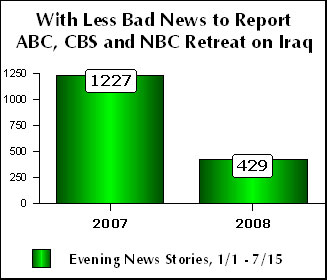 |
|||||||||
|
 |
||
|
 |
||||||||||||||||||||||||
|
||||||||||||||||||||||||
 |
||||||
|
||||||
 |
||||||
|
 |
||||||||||||||||||
|
||||||||||||||||||
 |
||||||||||||||||||||||||
|
||||||||||||||||||||||||
 |
||||||||||||||||||
|
||||||||||||||||||
|
|
|
Monday, July 21, 2008 | Contact: Colleen O’Boyle (703) 683-5004

Study: ABC, CBS & NBC War Coverage Plummets; Reporters Emphasize Casualties Over Surge Success
TV Keeps Pushing Bad Democratic candidate Barack Obama’s trip to Iraq is putting the network spotlight back on a war that garnered wall-to-wall coverage when the news was much bleaker a year ago. But as the troop surge has dramatically succeeded, the Big Three broadcast networks have shown little interest in documenting how the U.S. military is saving Iraq and achieving a signal victory in the war against terrorism.
Even though the violence has lessened dramatically — U.S. deaths in May and June totaled 48, down from 227 in May and June 2007 — the networks still emphasized bad news in their daily reporting. Attacks on civilians, car bombings, U.S. casualties and other bad news topics were featured in 190 stories (44%), while stories about U.S. achievements, the improving Iraqi military, better security and other good news topic totaled only 71, or 17% of the overall coverage. (The remaining stories either focused on neutral topics or balanced good and bad news.) To its credit, ABC’s World News with Charles Gibson provided the most even-handed coverage, with 34 stories focused on positive developments compared to 56 stories emphasizing bad news. On June 21, ABC reporter Miguel Marquez told viewers of big progress in Samarra, where the bombing of the Golden Dome mosque triggered major bloodshed two years ago: “Last year, U.S. forces here were attacked about 80 times a month. Since February, there have been a total of four attacks, a dramatic turnaround.” Two days earlier, ABC’s Terry McCarthy told a similar story of progress in the southern city of Basra, “a city reborn out of fear.” The CBS Evening News was the most lopsided, with 61 negative stories eclipsing its 16 good news stories by a nearly four-to-one ratio. Reporter Lara Logan was the most pessimistic in assessing the Iraqi military’s fight with Shi’ite militias in southern Iraq, declaring on April 7 that “[Prime Minister] Maliki’s leadership is in question....He’s widely seen as the loser in this fight.” In a May 29 report, Pentagon correspondent David Martin found a downside to success: “The troop surge in Iraq helped stem violence, but it also produced a surge in Army suicides.” For its part, the NBC Nightly News ran 73 stories emphasizing discouraging developments, or more than three times the 21 positive stories. One pessimistic phrase not used by NBC to describe the situation in Iraq this year: “civil war.” Back on November 17, 2006, NBC grandly announced how, as Today co-host Matt Lauer put it, “NBC News has decided a change in terminology is warranted, that the situation in Iraq with armed militarized factions fighting for their own agenda can now be characterized as a ‘civil war.’” NBC Nightly News championed the idea that Iraq was in a “civil war” for several months, then quietly dropped it late last summer. Reporter Jim Maceda was the last to use the term, back on September 10, 2007: “That civil war...it is truly brewing.” So, did the “civil war” abruptly end last summer, or is NBC tacitly admitting error? Last week, the respected war correspondent and author Michael Yon declared an American victory: “The Iraq War is over. We won. Which means the Iraqi people won.” The latest news is certainly encouraging, if only the networks could find time to report it. — Rich Noyes, with research assistance from Lyndsi Thomas and Peter Sasso
Home | News Division
| Bozell Columns | CyberAlerts |







 A new study by the Media Research Center finds that network evening news coverage of Iraq has fallen 65 percent in the past twelve months — a mere 429 stories so far this year, compared to 1,227 on the ABC, CBS and NBC evening news shows during the first six and a half months of 2007.
A new study by the Media Research Center finds that network evening news coverage of Iraq has fallen 65 percent in the past twelve months — a mere 429 stories so far this year, compared to 1,227 on the ABC, CBS and NBC evening news shows during the first six and a half months of 2007.